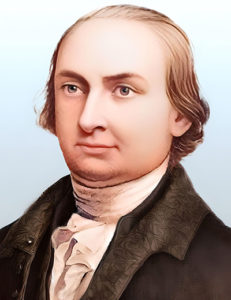
George Walton Comprehensive High School is named for George Walton, a prominent figure in American history and one of the signers of the Declaration of Independence from the state of Georgia. Born on November 15, 1749, in Cumberland County, Virginia, Walton played a crucial role in the fight for American independence.
At the age of twenty, Walton relocated to Savannah, Georgia, where he established himself as a successful lawyer. He quickly became involved in the revolutionary movement and joined the Sons of Liberty, advocating for colonial rights and resistance against British rule.
In 1776, Walton was elected to the Continental Congress, where he participated in the momentous decision to declare independence from Great Britain. As a representative of Georgia, he signed the Declaration of Independence on August 2, 1776, alongside Button Gwinnett and Lyman Hall, making him one of the state’s three signers.
Walton’s commitment to the cause of independence for the newly emerging United States extended beyond the halls of Congress. He served as a military officer during the Revolutionary War and fought in notable battles, including the Battle of Savannah and the Battle of Camden.
After the war, George Walton continued his political career, serving as governor of Georgia from 1789 to 1790. He also played a crucial role in drafting Georgia’s first state constitution. Throughout his life, Walton remained dedicated to the public service sector, working as a judge and holding various political positions.
George Walton’s contributions to the founding of the United States and the establishment of Georgia as a state are significant. His commitment to government service and involvement in the American Revolution has secured him a place in history.
George Walton on Slavery and Native Americans
George Walton’s views on slavery and Native Americans were reflective of the prevailing attitudes and policies of his time, which were shaped by a complex mix of cultural, economic, and political factors. It’s important to note that attitudes toward these issues varied among many of the Founding Fathers, and Walton’s positions were not uniform throughout his life.
On the issue of slavery, Walton was a slave owner. Slavery was deeply entrenched in the economic and social fabric of the Southern states, and Walton, as a Georgia representative, was likely influenced by this prevailing institution. However, there is limited available information on Walton’s specific views or actions regarding slavery beyond his ownership of enslaved individuals.
Regarding Native Americans, Walton’s position reflected the prevailing attitudes of many early American settlers, which often included the displacement and mistreatment of Native American tribes. During the early years of the United States, conflicts between settlers and Native American tribes were common, driven by competing interests over land and resources. It is worth noting that Walton’s focus was primarily on issues related to Georgia and the emerging state government, rather than broader national policies toward Native Americans.
While Walton’s views on these matters do not align with contemporary perspectives that prioritize equality, justice, and respect for all individuals, understanding the complexities and nuances of these historical figures helps shed light on the challenges and contradictions they faced as they navigated the tumultuous era of the American Revolution and the early years of the new nation.
On honoring a historical figure who was also a slave owner
The question of whether to honor historical figures who were slave owners is a complex and debated issue. It involves balancing the recognition of their contributions to history with acknowledging the harm and injustices associated with their actions.
George Walton, as one of Georgia’s signers of the Declaration of Independence, played a significant role in shaping the nation’s history. However, his status as a slave owner is a troubling aspect of his legacy. When deciding whether to honor figures like Walton, it’s important to consider the context of their time, the entirety of their contributions, and the impact of their actions on different communities.
Communities may choose to engage in open dialogues and discussions about these historical figures, their actions, and their legacy. In some cases, contextualizing their contributions within a broader historical narrative that includes discussions about slavery and its consequences can provide a more nuanced understanding.
Ultimately, the decision to honor historical figures who were also slave owners involves careful consideration of multiple perspectives, values, and sensitivities. It’s a conversation that encourages reflection on history, ethics, and the ongoing efforts towards justice and equality.



